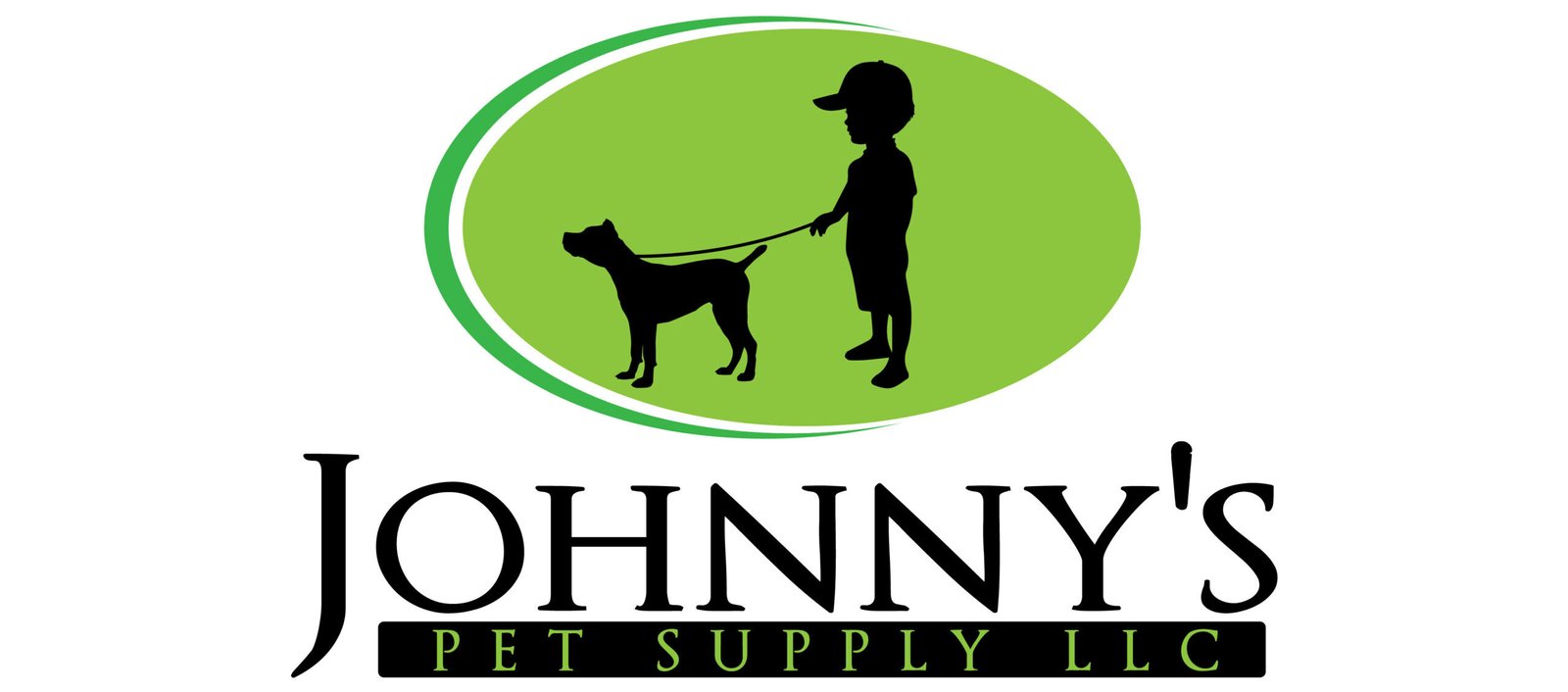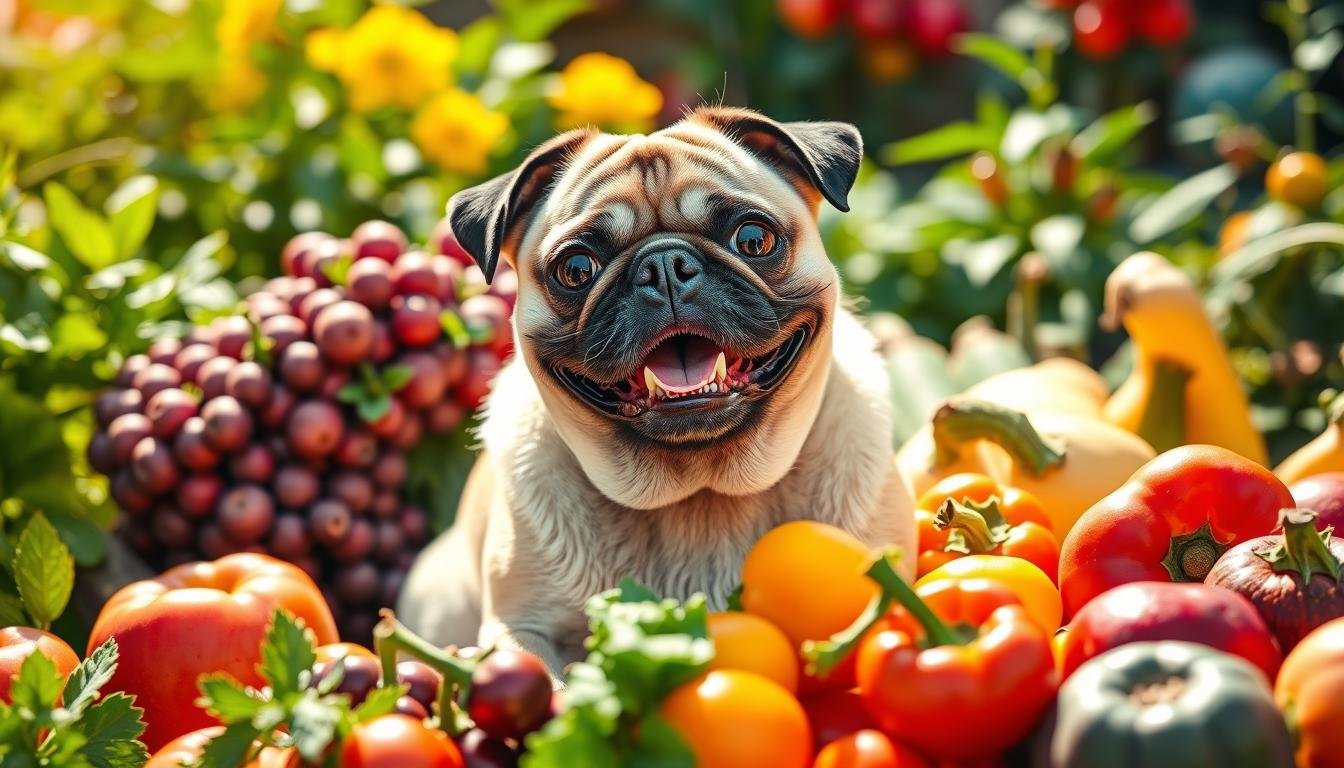How to avoid food allergies in Pugs
Only 0.2% of dogs have food allergies, but Pugs might be more at risk. As a Pug owner, knowing about common allergies is key. Recognizing signs of allergies in Pugs helps keep them comfortable and avoids food allergy issues.
Pugs can have three types of allergies: environmental, food, and flea. Signs include scratching, biting, and licking too much. They might also have red skin, ear infections, and stomach problems. Working with your vet is crucial to find and treat these allergies.
Understanding Pug Allergies
Pugs, like many other dog breeds, can suffer from allergies. These allergies can cause discomfort and health issues. They can be categorized into three main types: environmental, food, and flea allergies. Knowing the symptoms and causes of these allergies is key to caring for your Pug.
Environmental, Food, and Flea Allergies in Pugs
Environmental allergies, also known as atopic dermatitis, can be triggered by pollen, dust mites, mold, and other airborne irritants. Food allergies arise from a negative reaction to certain ingredients in their diet. Flea allergies, on the other hand, are a result of flea bites, where the saliva of the flea causes an allergic reaction.
Identifying Allergic Reactions in Pugs
Pugs may exhibit various symptoms when suffering from allergies, such as:
- Excessive scratching, biting, or licking of their skin
- Red and inflamed skin
- Chronic ear infections
- Gastrointestinal issues like vomiting or diarrhea
If you observe any of these symptoms in your Pug, it’s important to consult a veterinarian for a proper diagnosis. They may perform tests, such as blood tests or skin tests, to identify the underlying cause of the allergic reaction.
“By keeping a journal of your Pug’s daily experiences, the source of the allergy can be pinpointed more effectively.”
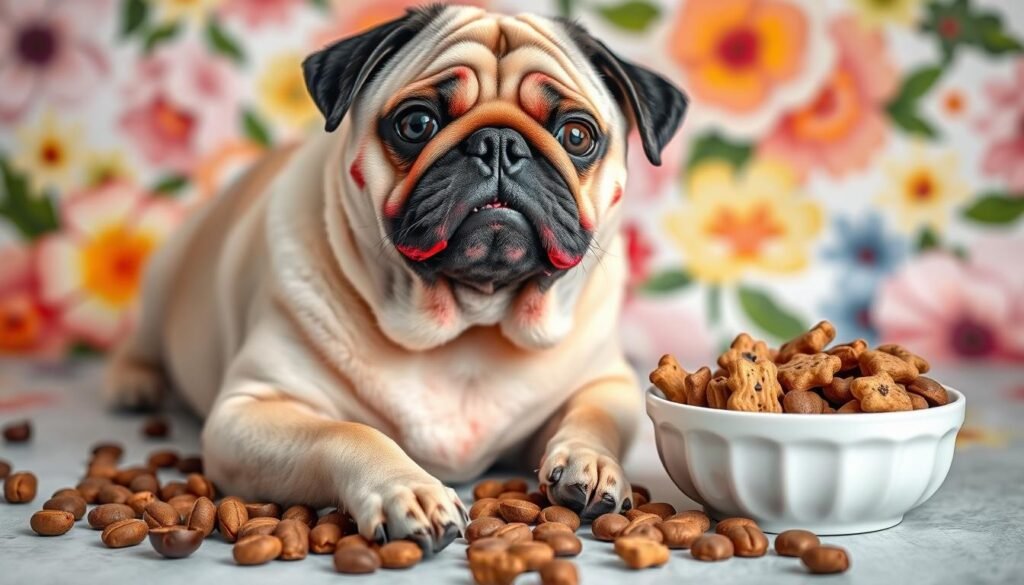
Treating Pug Allergies
Dealing with allergies in your Pug can be tough, but there are ways to manage them. The first step is to figure out what kind of allergy your dog has. It could be from the environment, food, or fleas.
Environmental Allergy Management
To fight environmental allergies, cut down your dog’s exposure to allergens. Use air purifiers, clean your home often, and avoid walks when pollen is high. Also, medicated shampoos and regular baths can help prevent skin problems.
Food Allergy Solutions
If your Pug has a food allergy, your vet might suggest an elimination diet. This means removing possible allergens from your dog’s food to find the problem. Once you know what’s causing the allergy, you can switch to a safe diet.
Combating Flea Allergies
Flea allergies are best prevented. Use flea prevention products like topical treatments or pills to keep fleas away. If fleas do show up, your vet can help you get rid of them.
How you treat your Pug’s allergies depends on the type and how severe it is. Working with your vet, you can create a plan to help your Pug feel better and live well.
“The best way to treat allergies in Pugs is to identify the root cause and address it directly. With the right approach, you can help your furry friend find relief and live a happy, healthy life.”
How to Avoid Food Allergies in Pugs
Keeping a Pug’s diet free from allergens is key. They often react to wheat and corn. To steer clear of these food allergies in Pugs, choose a top-notch, hypoallergenic dog food. Make sure it’s without wheat, soy, corn, and by-products.
When picking a pug-friendly diet, look at grain-free diets for Pugs from brands like Addiction Food, Canidae, Fromm Family Food, Stella & Chewy’s, and Ziwi Peak. These hypoallergenic dog food choices are made for Pugs. They help avoid bad reactions.
- Avoid common problem ingredients like wheat, corn, and soy
- Choose high-quality, hypoallergenic dog food brands
- Opt for grain-free diets for Pugs to minimize allergic triggers
By choosing pug-friendly diets and watching for food sensitivities, you can keep your Pug healthy. This way, you can avoid food allergies in Pugs.
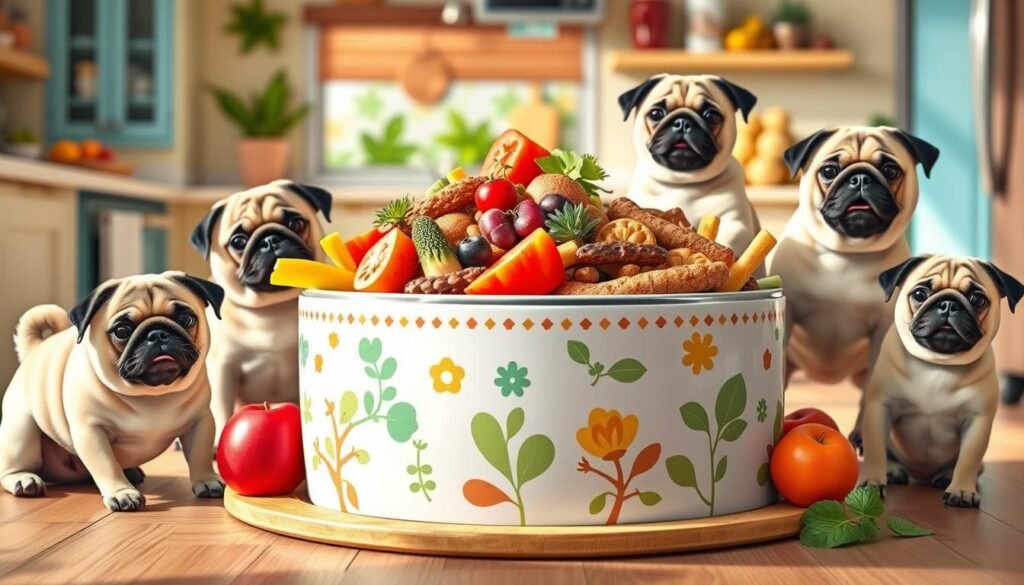
Best Food Diet for Dogs With Food Allergies
If your Pug has food allergies, finding the right diet is key. Look for food that doesn’t trigger allergies and is nutritious. This ensures your dog stays healthy.
Therapeutic diets like Blue Buffalo Natural Veterinary Diet HF and NP are great for dogs with food allergies. For food intolerances, try Blue Basics Skin and Stomach Care or Blue True Solutions Perfect Skin and Coat.
Choosing the right hypoallergenic dog food for your Pug involves several factors:
- Ingredients rich in fatty acids help reduce inflammation and improve skin health.
- Diets that meet AAFCO standards ensure your dog gets all the nutrients it needs.
- Vets recommend different diets, including hydrolyzed, novel, and elimination diets.
Here are some top best dog food for food allergies:
- Royal Canin Veterinary Diet Adult Ultamino Dry Dog Food is great for its hydrolyzed proteins and essential nutrients.
- Blue Buffalo True Solutions Perfect Skin & Coat is excellent for environmental allergies, thanks to omega-3 and -6 fatty acids.
- Open Farm Kind Earth Premium Plant Kibble Recipe is a top plant-based option for dogs with meat allergies.
- Wellness Simple Limited Ingredient Diet Lamb & Oatmeal is a budget-friendly choice with gentle ingredients.
For limited ingredient diets for Pugs and prescription diets for Pug allergies, always consult your vet. They can help choose the best diet for your dog.
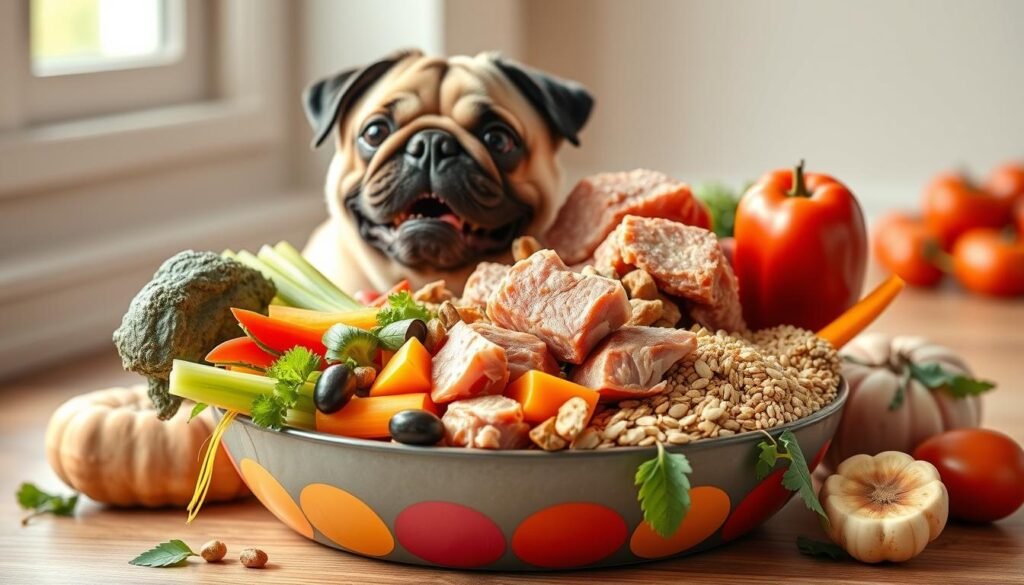
“Tailoring food choices based on individual dog requirements is crucial for managing allergies effectively in pets.”
At-Home Allergy Relief
Helping your Pug feel better at home is key. You can do this with supplements and regular grooming.
Omega-3 and Omega-6 Supplements
Supplements with omega-3 and omega-6 fatty acids, like Neo Bites Allergy Aid Meal Topper, are great. They help your pup’s skin stay healthy and reduce inflammation from allergies. These nutrients boost your dog’s immune system and lessen irritation from allergens.
Regular Grooming
Keeping up with grooming is vital for your Pug’s allergies. Brushing and bathing regularly can remove allergens from their fur. This lowers the chance of skin infections and discomfort. Use a gentle, hypoallergenic shampoo to care for their sensitive skin.
Also, keeping your Pug at a healthy weight is important. Being overweight can make allergies worse and increase the risk of allergic reactions.
“Home remedies like omega-3 supplements and consistent grooming can provide significant relief for Pugs dealing with allergies.”
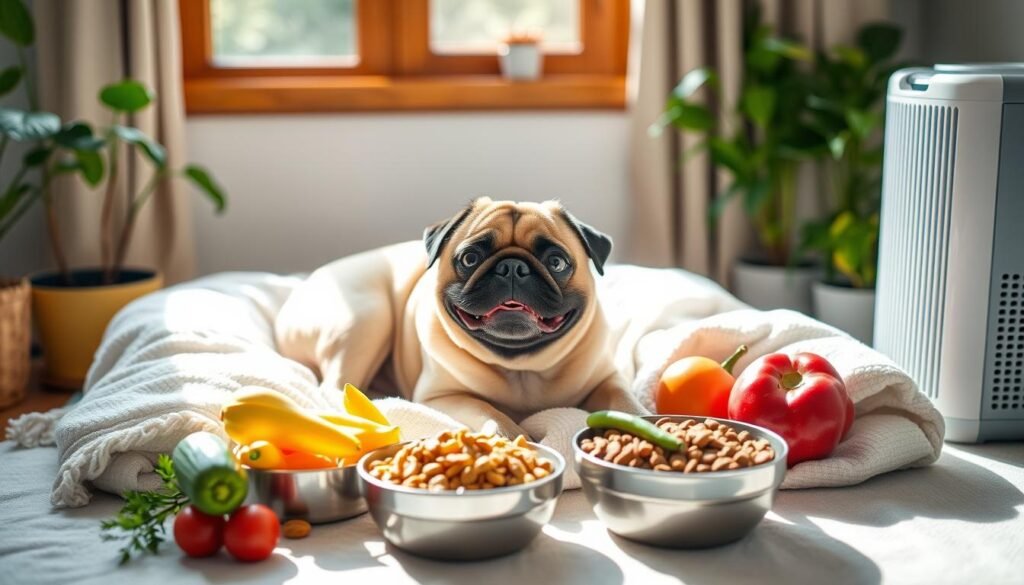
By adding these home allergy management tips to your Pug’s routine, you can greatly improve their life. They’ll feel better and enjoy their time with you more.
When to Seek Veterinary Care
If home remedies for your Pug’s allergies don’t work, or if their symptoms get worse, it’s time to see a vet. Your vet might do blood tests or skin tests to figure out the allergy. In some cases, they might send you to a veterinary dermatologist for more checks.
Getting help from a vet is key to keeping your Pug healthy and happy. Veterinary care for Pug allergies is vital, especially when you need to know when to see a vet for Pug allergies.
“Food allergies in dogs are one of the most common allergies or hypersensitivities encountered, affecting a substantial portion of the canine population.”
Studies show that true food allergies in dogs are much less common than food sensitivities. But figuring out diagnosing allergies in Pugs can be tricky. Your vet might suggest an elimination trial for 8 to 12 weeks to find out what food is causing the problem.
Since there’s no cure for food allergies in dogs, avoiding the allergenic foods is the best treatment. With the right veterinary care for Pug allergies, you can help your Pug live a happy and healthy life.
Approved and Unapproved Dog Food Brands
As a Pug owner, you know how crucial it is to feed your furry friend quality dog food for Pugs that won’t cause allergies. Pugs often have allergies, especially to wheat and corn. We’ve made a list of approved dog food brands for Pugs and brands to avoid to help you choose wisely.
Approved Brands for Pugs
- Addiction Food
- Canidae
- Fromm Family Food
- Stella & Chewy’s
- Ziwi Peak
These approved dog food brands for Pugs offer high-quality, limited-ingredient formulas. They are less likely to cause allergic reactions in your pup. They use natural ingredients and avoid common allergens like wheat, corn, and soy.
Brands to Avoid for Pugs
- Blue Buffalo
- Nestle Purina
- Many grocery store pet food brands
Avoid unapproved dog food brands for Pugs that often have wheat, corn, and soy. These low-quality dog food options can harm your Pug’s sensitive digestive system. They may seem cheap, but they’re not worth the risk.
Investing in a quality dog food for Pugs is essential. Choose an approved brand to keep your pup happy and healthy. Your Pug’s well-being is worth every penny!
Where to Buy Pug Food
Finding the right food for your pug might mean looking online. Some local pet stores carry good brands, but online stores like Amazon, Chewy, and Petflow have more options. They offer automatic delivery of quality pug food, making it easy to keep your pet’s diet right.
Shopping locally? Look for specialty pet stores that focus on natural, breed-specific foods. The Green Spot, Nature Dog, and Treats on a Leash in the Midwest are good places to start. Their staff can help you find the best food for your pug’s needs.
Choose a brand that’s made for small breeds, no matter where you buy. The right food helps your pug stay healthy and avoid allergies.
